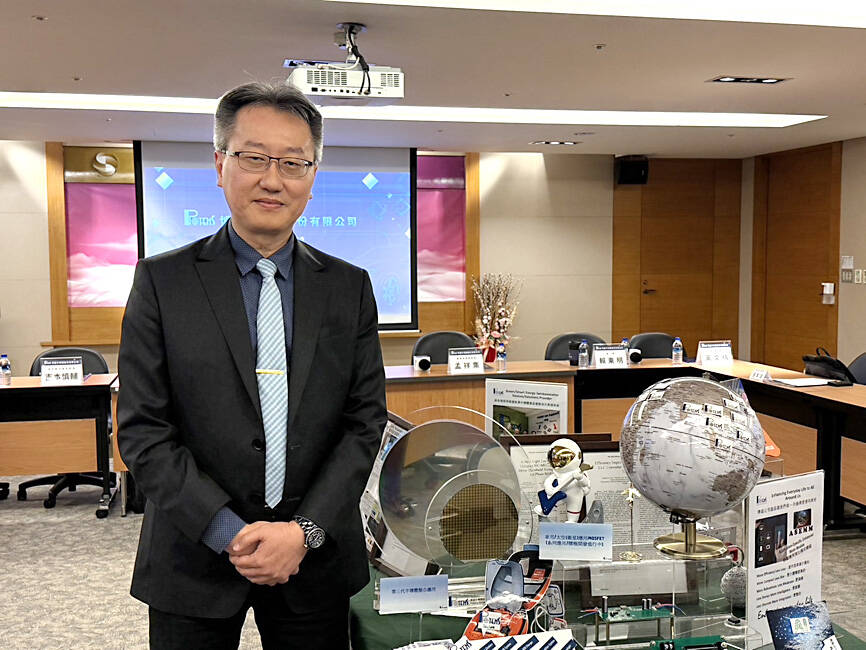Power chip designer Potens Semiconductor Corp (博盛半導體) yesterday said it is cautiously optimistic about its business prospects next year, citing an improving global economy, as well as rising demand for power semiconductors for vehicles, and for artificial intelligence (AI) PCs and servers.
“Semiconductor demand is highly correlated to the world economy. As we are not seeing major headwinds for the economy, we expect next year to be a better year than this year,” Potens spokeswoman Jessie Peng (彭卓蘭) told a news conference in Taipei. “We are holding a cautiously optimistic attitude toward next year.”
Potens is a chip designer focused on developing power metal-oxide-semiconductor field-effect transistors (MOSFETs) used in a broad range of applications including electric vehicles (EV), servers and green energy devices.

Photo: Vanessa Cho, Taipei Times
The company said that its new high-end power MOSFETs used in vehicles, and AI PCs and servers would help drive revenue growth.
The company started shipping low volumes of power MOSFETs used in AI servers this year and expects shipments to increase gradually next year, Potens chairman Menq Meng (孟祥集) said.
Potens has secured orders from two of the world’s four major cloud service providers to supply server MOSFETs, indicating that it is capable of competing with global peers, Mega Securities Co (兆豐證券) said.
The company later this quarter plans to roll out new advanced power MOSFETs used in AI PCs — called driver MOS integrated drive ICs, which are for central processing units and graphic processing units, it said.
Another major growth area is power MOSFETs for EVs and gasoline-powered vehicles, the company said, adding that it ships its products through tier-one auto component suppliers.
Its products are in Asian vehicles and in one of five premium European car brands, it said.
The company generated NT$1.06 billion (US$32.61 million) in revenue in the first three quarters of the year, little changed from NT$1 billion in the same period last year.
The consumer electronics segment was its biggest revenue source, contributing 43 percent of overall revenue in the period, while industrial devices was second at 26 percent and the auto segment third at 15 percent, the company said.
Net profit soared about 64 percent to NT$201.48 million in the nine-month period from NT$122.97 million in the same period last year.
Earnings per share jumped to NT$35.85 from NT$28.3, while gross margin rose to 35.85 percent from 28.3 percent.
Potens is scheduled to debut its shares on the Taipei Exchange next month.

In Italy’s storied gold-making hubs, jewelers are reworking their designs to trim gold content as they race to blunt the effect of record prices and appeal to shoppers watching their budgets. Gold prices hit a record high on Thursday, surging near US$5,600 an ounce, more than double a year ago as geopolitical concerns and jitters over trade pushed investors toward the safe-haven asset. The rally is putting undue pressure on small artisans as they face mounting demands from customers, including international brands, to produce cheaper items, from signature pieces to wedding rings, according to interviews with four independent jewelers in Italy’s main

Japanese Prime Minister Sanae Takaichi has talked up the benefits of a weaker yen in a campaign speech, adopting a tone at odds with her finance ministry, which has refused to rule out any options to counter excessive foreign exchange volatility. Takaichi later softened her stance, saying she did not have a preference for the yen’s direction. “People say the weak yen is bad right now, but for export industries, it’s a major opportunity,” Takaichi said on Saturday at a rally for Liberal Democratic Party candidate Daishiro Yamagiwa in Kanagawa Prefecture ahead of a snap election on Sunday. “Whether it’s selling food or

CONCERNS: Tech companies investing in AI businesses that purchase their products have raised questions among investors that they are artificially propping up demand Nvidia Corp chief executive officer Jensen Huang (黃仁勳) on Saturday said that the company would be participating in OpenAI’s latest funding round, describing it as potentially “the largest investment we’ve ever made.” “We will invest a great deal of money,” Huang told reporters while visiting Taipei. “I believe in OpenAI. The work that they do is incredible. They’re one of the most consequential companies of our time.” Huang did not say exactly how much Nvidia might contribute, but described the investment as “huge.” “Let Sam announce how much he’s going to raise — it’s for him to decide,” Huang said, referring to OpenAI

The global server market is expected to grow 12.8 percent annually this year, with artificial intelligence (AI) servers projected to account for 16.5 percent, driven by continued investment in AI infrastructure by major cloud service providers (CSPs), market researcher TrendForce Corp (集邦科技) said yesterday. Global AI server shipments this year are expected to increase 28 percent year-on-year to more than 2.7 million units, driven by sustained demand from CSPs and government sovereign cloud projects, TrendForce analyst Frank Kung (龔明德) told the Taipei Times. Demand for GPU-based AI servers, including Nvidia Corp’s GB and Vera Rubin rack systems, is expected to remain high,